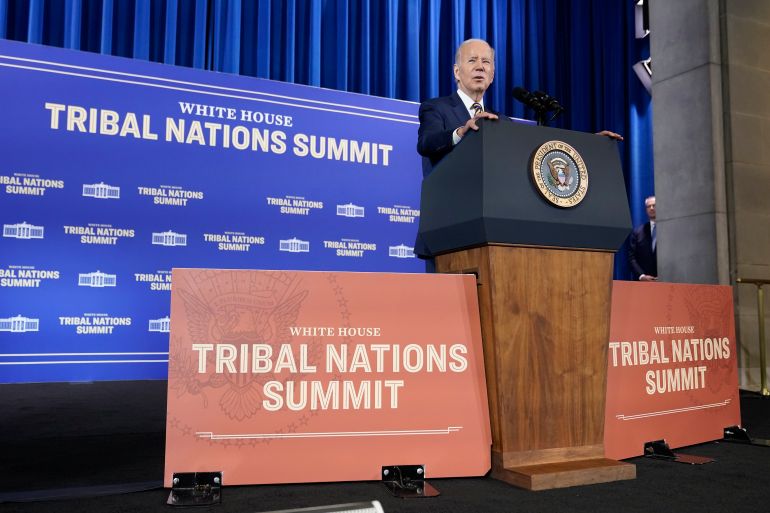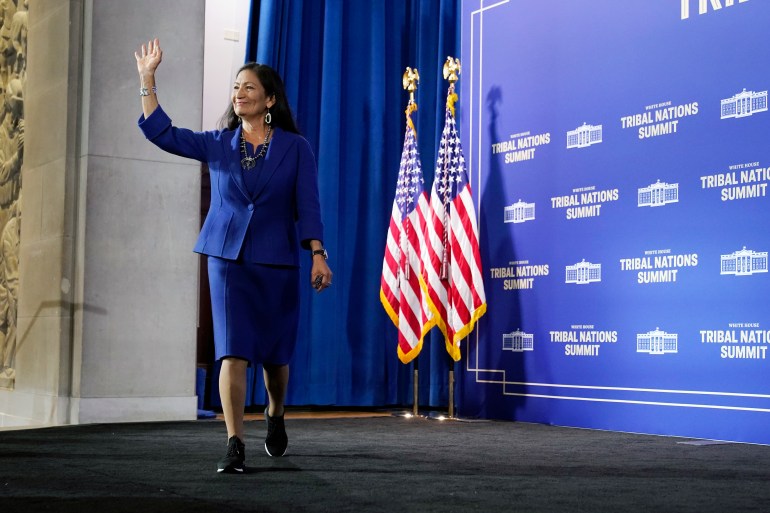US President Joe Biden announces Indigenous spending increase
During its Tribal Nations Summit, the White House committs to better communication and more spending on climate change.

President Joe Biden has announced plans to improve consultation and increase spending on Indigenous issues in the United States as part of his commitment to “prioritise and respect nation-to-nation relationships”.
In a speech at the Department of the Interior in Washington, DC, on Wednesday, during the first in-person White House Tribal Nations Summit in six years, Biden emphasised the effects of climate change on Indigenous populations.
Keep reading
list of 3 itemsRestoring a culture: One Indigenous leader’s fight for her people
The Hopi farmer championing Indigenous agricultural knowledge
“As all of you know, there are tribal communities at risk of being washed away – washed away by superstorms, rising sea levels and wildfires raging,” Biden said, recalling his visits to fire- and storm-ravaged regions.
“That’s why today I’m announcing [a] $135m commitment to help 11 tribal communities from Maine, Louisiana, Arizona, Washington state and Alaska to move, in some cases, their entire communities back to safer ground.”
Biden also announced that he would ask Congress to allocate $9.1bn in mandatory funding for the Indian Health Services, a federal agency responsible for providing healthcare to federally recognised Native American tribes and Alaska Native people.
There are 574 federally recognised Indigenous tribes in the US and many of them are “more vulnerable to the health impacts of climate change than the general population”, the US Environmental Protection Agency (EPA) warns.
The EPA cites unreliable infrastructure, institutional barriers like limited access to resources and traditional territory, and higher rates of certain medical conditions such as asthma increasing the vulnerability of Indigenous groups.
A 2020 report from the US Bureau of Indian Affairs highlighted “a significant unmet need for financial resources” as Indigenous communities prepare for the effects of climate change.
It forecasted that costs for relocation would total up to $3.45bn for Alaska Native communities and $1.365bn for Indigenous communities in the contiguous US over the next 50 years.
During the summit, Biden touted his administration’s record of providing funding for tribal communities, pointing to $32bn in the American Rescue Plan and $13bn in the Bipartisan Infrastructure Law earmarked for Indigenous people.
In his speech, Biden laid out a vision that included safer drinking water, more affordable Internet and restoring waterways and ecosystems.
He pointed to a project on the Pine Ridge Reservation in South Dakota, where federal infrastructure spending will finance repairs on two dams – the Oglala Dam and Allen Dam – that are deemed a hazard to human safety.
“For years and years now, the tribes have lived in the shadow of disaster, worried the dams would break, destroy their communities,” Biden said. “So soon they’ll be able to sleep a much more peaceful night, knowing those dams have been fully repaired.”

In addition to the proposed spending, Biden also announced on Wednesday that he had signed a new presidential memorandum to improve consultation between the federal government and tribal nations.
The memorandum mandates that federal agencies communicate clearly the deadlines and context for each consultation and maintain public records about them. It also requires that all relevant federal agencies get annual training on the tribal consultation process.
“Federal agencies should strive to reach consensus among the tribes,” Biden said, describing it as “a whole changed approach”.
“On my watch, we’re ushering in a new era and advancing a way for the federal government to work with tribal nations,” he told the audience. “And it starts by appointing Native Americans to lead the front lines of my administration.”
Biden’s remarks were introduced by Secretary of the Interior Deb Haaland, a member of the Laguna Pueblo tribe and the first Indigenous person to be named a Cabinet secretary.
She is one of several historic appointments under the Biden administration, including Lynn Malerba of the Mohegan Tribe’s appointment as the first Indigenous US treasurer earlier this year.
Biden also articulated his commitment to protecting Avi Kwa Ame, the Mojave name for an area on the southern tip of Nevada known as Spirit Mountain.
A white granite peak that rises above a desert landscape rugged with canyons and rock formations, Avi Kwa Ame is considered the spiritual birthplace of 10 Yuman-speaking tribes.
“When it comes to Spirit Mountain and surrounding ridges and canyons in southern Nevada, I’m committed to protecting this sacred place that is central to the creation story of so many tribes that are here today,” Biden said.
Currently, 13,564 hectares (33,518 acres) of the area is designated as federal wilderness.
A coalition of Indigenous tribes, environmental groups and Nevada legislators are pushing for an estimated 182,100 hectares (450,000 acres) to be named a national monument, protected from development.